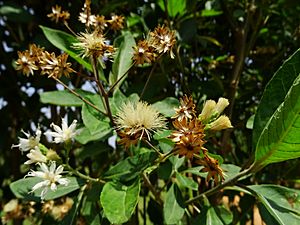Vernonia amygdalina facts for kids
Quick facts for kids Vernonia amygdalina |
|
|---|---|
 |
|
| Scientific classification |
|
| Kingdom: | Plantae |
| Clade: | Tracheophytes |
| Clade: | Angiosperms |
| Clade: | Eudicots |
| Clade: | Asterids |
| Order: | Asterales |
| Family: | Asteraceae |
| Genus: | Vernonia |
| Species: |
V. amygdalina
|
| Binomial name | |
| Vernonia amygdalina Delile
|
|
| Script error: The function "autoWithCaption" does not exist. | |
Script error: No such module "Check for conflicting parameters".
Vernonia amygdalina, also known as bitter leaf, is a small shrub that grows in warm parts of Africa. It belongs to the daisy family, which includes many well-known flowers. This plant usually grows to be about 2 to 5 meters (6.5 to 16 feet) tall. Its leaves are shaped like an oval and can be up to 20 centimeters (8 inches) long. The plant's bark feels rough to the touch.
People call V. amygdalina by many names across Africa. In English, it's often called "bitter leaf" because of its strong, bitter taste. Some other common names include grawa (Amharic), ewuro (Yoruba), onugbu (Igbo), and shuwaka (Hausa). In Cameroon, it's known as ndoleh.
Contents
Amazing Uses of Bitter Leaf
Bitter leaf is very useful to people in many ways, especially in cooking and for health.
Bitter Leaf in Your Food
The leaves of the bitter leaf plant are a popular vegetable in many African countries. People use them to make delicious soups and stews. Before cooking, the leaves are often washed to make them less bitter. After washing, they are dried and added to meat dishes.
In Nigeria, some people even use bitter leaf in a special way. They use the leaves instead of hops to brew beer. This shows how versatile the plant can be!
Other Cool Uses
Beyond food, bitter leaf has other interesting uses:
- Dental Care: In Nigeria, people use small twigs and sticks from the plant as a "chewing stick." This helps clean their teeth and keep their mouths healthy.
- Making Soap: In Uganda, the stems of the bitter leaf plant are used to make soap.
- Health Benefits: In Ghana, younger bitter leaf leaves are known for their helpful properties. Studies have shown they might help with blood sugar levels and reduce swelling in the body.
Animals and Bitter Leaf
Did you know that animals also use bitter leaf? Wild chimpanzees have been seen eating the leaves of this plant. They often do this when they are sick with parasites. It's like they know the plant can help them feel better! This behavior is a type of natural medicine used by animals.
See also
 In Spanish: Vernonia amarga para niños
In Spanish: Vernonia amarga para niños
 | Tommie Smith |
 | Simone Manuel |
 | Shani Davis |
 | Simone Biles |
 | Alice Coachman |

